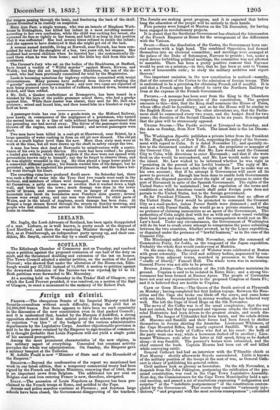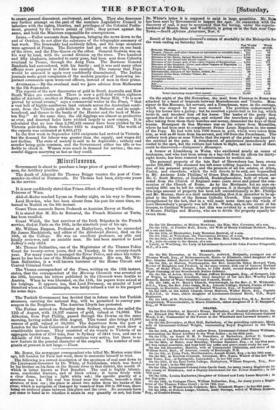,furtigu Ea FRANCE.—The obsequious Senate of his Imperial Majesty voted
the Senatils-consultum without much difficulty, fixing the civil list at 25,000,000 francs. But there appears to have been no such unanimity in the discussion of the new constitution even in that packed Council ; and it is understood that, headed by the Marquis d'Audiffret, a strong opposition showed itself to that salient point of the scheme the adoption or rejection "en bloc" of the budgets of the various administrative departments by the Legislative Corps. Another objectionable provision is said to be the power retained by the Emperor to sign treaties of commerce. It is thought probable that Louis Napoleon will not yield a single point of his assumed prerogative.
Among the most prominent characteristics of the new regime, is the military aspect of everything. Concealed but constant activity pervades the whole war administration. On Sunday, the Emperor gave a military banquet at the Tuileries. M. Achille Fould is now "Minister of State and of the Household of the Emperor."
BELGIUM.—Beyond the confirmation of the report we mentioned last week in our latest edition, that a temporary commercial treaty had been signed by the French and Belgian Ministers, renewing that of 1845, there is no important news from Belgium. The additional ten per cent on Belgian coal and iron entering France is now, therefore, abrogated.
ITALY. —The accession of Louis Napoleon as Emperor has been pro- claimed to the French troops at Rome, and notified to the Pope.
Arrests and police searches continue at Florence ; and fourteen large schools have been closed, the Government disapproving of the teachers. The Jesuits are making great progress, and it is expected that before long the education of the people will be entirely in their hands. Five persons were hanged at Mantua on the 7th December, for having been engaged in revolutionary projects. It is stated that the Sardinian Government has obtained the intercession of the French Emperor at Rome for the arrangement of the differences with the Vatican.
SPAIN.—Since the dissolution of the Cortex, the Government have car- ried matters with a high hand. The combined Opposition had formed themselves into an electoral committee ; and meetings were arranged at the palace of the Duke of Sotomayor, Narvaez to preside ; but, under a royal decree forbidding political meetings, the committee was not allowed to assemble. There has been a pretty positive rumour that Narvaez would be sent on a mission,—in fact, that ho has been so sent to Vienna a sort of honourable exile ; to study the military archives and report thereon !
One important omission in the new constitution is noticed—namely, that of the consent of the Cortex to the admission of foreign troops. This is understood to be a provision for obtaining French aid if needful. It is said that a French agent has offered to carry the Northern Railway to Irun at the expense of the French Government.
Pnossta.—A message has been sent from the King to the Chambers respecting the proposed alteration of the constitution. The project amounts to this—first, that the King shall nominate the House of Peers, whose office shall be hereditary ; and so far the House will be similar to the English House of Peers. The other alterations are, that the Parlia- ment shall be summoned every two years, and the budget fixed for two years ; the duration of the Second Chamber to be six years. It is expected that the plan will be strenuously opposed.
UNITED STATES.—The Pacific arrived at Liverpool on Saturday, and the Asia on Sunday, from New York. The latest date is the 1st Decem- ber.
The Washington Republic publishes a private letter from the President to Mr. Hugh Maxwell, of New York, respecting the policy of the Govern- ment with regard to Cuba. It is dated November 12; and specially re- fers to the threatened conduct of Mr. Law, the proprietor or manager of the Crescent City. It is stated that Mr. Law would send the Crescent City to Cuba, with directions to enter Havannah ; and that if she were fired on she would be surrendered, and Mr. Law would make war upon the island. Mr. Law wished to be informed whether he was right in "persisting in the pursuit of his lawful business." The reply of Mr. Fillmore is that he does not admit the right of Mr. Law to make war on his own account ; that if he attempt it Government will exert all its power to prevent it. Enough has been done to enable both Governments to settle the disputed question about the right of any persons to enter the port of Havannah in spite of the Spanish Government. The rights of the United States will be maintained ; but the regulation of the terms and conditions on which American vessels shall enter foreign porta does not pertain to the United States, but to the foreign government. So far President Fillmore. The Republic mentions that no officer of the United States Navy would be promoted to command the Crescent City as a mail-packet, unless Purser Smith were dismissed ; and if she went out with Purser Smith, she would go as a private steamer, having no pretence of claiming immunities as an agent of the Government. The authorities of Cuba might deal with her as with any other vessel violating their local laws and regulations, and the consequences would rest on Mr. Law's head. Under any circumstances, the Government of Washington will do its best to crush every attempt to compromise the peace subsisting between the two countries, whether avowed, as by the Lopez expedition, or disguised under the pretence of " lawful business," as in the case of the Crescent City.
The Mississippi sailed on the 30th November, under the command of Commodore Perry, for Jeddo, as the vanguard of the Japan expedition. Probably the whole fleet would rendezvous at Madeira.
On the same day, the obsequies of Webster were celebrated at Boston with great solemnity. The civil and military bodies, augmented by con- tingents from adjacent towns, marched in procession to the famous " cradle of liberty," Faneuil Hall. The whole town was in mourning. General Pierce was not able to be present.
BUENOS AYRES.—The revolution of the 11th September maintains its ground. Urquiza is said to be isolated in Entre Rios; and a strong Go- vernment has been formed at Buenos Ayres. The people of Corrientos have not sent any representatives to the proposed Congress at Santa Fe; and it is believed they are hostile to Urquiza.
CAPS or GOOD HOPE.—The Queen of the South arrived at Plymouth on Monday ; having completed her first Indian voyage. Between the Mau- ritius and the Cape she broke one blade off the screw, and came home with one blade. Severely tested in stormy weather, she has behaved very well. She left the Cape of Good Hope on the 6th November.
The news of the Caffre war is of the usual complexion ; that the war had not ended, but that by repeated and vigorous attacks the Caffres and rebel Hottentots had been driven to the greatest straits, and much dis- persed. The Mager of Uithaalder had been burnt, and the rebels driven off. Macomo and Sandilli and their forces had been forced to shelter themselves in forests skirting the Amatolas. Lieutenant Whitmore, of the Cape Mounted Rifles, had nearly captured Sandilli. With a small force he attacked a body of Caffrcs who fled at his onset : the bulk of the party went one way, while a horseman dashed off in another ; Lieu- tenant Whitmore rode after the latter at full speed, firing as he dashed along—it was Sandilli. The pursuer's horses were exhausted, and the chief entered the bush. Captain Hearns had been cut off and killed while convoying cattle.
General Cathcart had had an interview with the T'Slambio chiefs at Fort Murray : shortly afterwards Seyolo surrendered. Little is known of the military position of the troops at the seat of war, as General Cath- cart is chary of publishing his general orders. Civil matters look as gloomy as heretofore. On the 4th November, a despatch from Sir John Pakington, postponing the ratification of the pro- mised constitution, was read in the Cape Town Legislative Assembly. Next day, the Commissioners for the Cape Town Municipality held a spe- cial meeting, and passed a set of resolutions expressing " indignation and surprise " at the " indefinite postponement " of the constitution contem- plated by the Government. That course they consider "extremely inju- dicious," " and pregnant with the most serious =sequences" ; calculated to create general discontent, excitement, and alarm. They also denounce any further attempt on the part of the nominee Legislative Council to interfere with the rights, liberties, and privileges of the Colonial Parlia- ment, granted by the letters patent of 1850; they protest against the same, and hold the Ministers responsible for consequences.
LYDrA —Fuller accounts from Rangoon, bringing the news down to the end of October, do not alter the substance of the telegraphic summary of last week. The Irrawaddy had suddenly fallen, and the large steamers were aground at Promo. The Enterprise had got on shore on one bank of the river, and the Fire-Queen on the other. General Godwin was on his way by land, with the second division up the river. Two hundred and fifty elephants, intended to carry guns, had been sent from Calcutta overland to Prome, through the Aeng Pas& The Burmese General Bandoola had surrendered, with his family ; and it was said many other officers were prepared to follow his example. The rumour that Pegu would be annexed is again very confidently disseminated. The Indian journals make great complaints of the modern practice of bestowing im- portant commands upon worn-out officers, instead of men in their prime.
ALISTRALLL—By the overland mail we have advices from Melbourne to the 7th September. The reports of the new discoveries of gold in South Australia and New South Wales are confirmed. There is now a gold-field within eighteen miles of Adelaide ; another at Bingara ; another at Daisy Hill. " It is now proved by actual events," says a commercial writer in the Times, " that a vast belt of highly-auriferous land extends across the Australian conti- nent, from the Victoria gold-fields to those at Bathurst and its neigh- bourhood, and thence to the banks of the Hunter and the back of More- ton Bay." At the same time, the old diggings are almost as productive as ever, and deserted holes have yielded largely to new comers. It is calculated that no less than 2,832,422 ounces have been yielded by the Victoria gold-fields, from October 1851 to August 1852. The worth of the exports was estimated at 8,863,4771.
In the first week in September 4283 emigrants had arrived in Victoria : but the demand for labour was greater than the supply, and wages did not decline. The state of society is said to be deplorable ; robbery and murder being quite common, and the Government either too idle or too feeble to check it. Women were much in demand for service ; the suc- cessful diggers marrying as fast as they could.



































 Previous page
Previous page